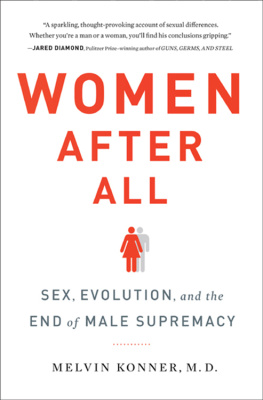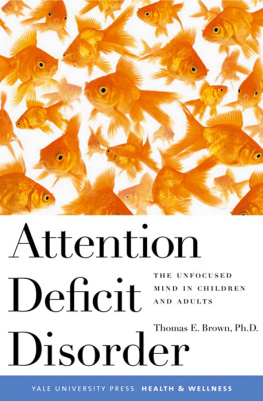Women After All
Sex, Evolution, and the
End of Male Supremacy
Melvin Konner, M.D.

W. W. Norton & Company
New York London
In memory of
Irven DeVore
anthropologist, mentor, friend,
and for
Susanna, Adam, Sarah, Logan, Becky, and Ethan,
who are the future
Contents
All these arguments we have to-day to offer for woman, and one, in addition, stronger than all besides, the difference in man and woman. Because man and woman are the complement of one another, we need womans thought in national affairs to make a safe and stable government.
Elizabeth Cady Stanton, January 19, 1869
Women After All
T his is a book with a very simple argument: women are not equal to men; they are superior in many ways, and in most ways that will count in the future. It is not just a matter of culture or upbringing, although both play their roles. It is a matter of biology and of the domains of our thoughts and feelings influenced by biology. It is because of chromosomes, genes, hormones, and nerve circuits. It is not mainly because of what your mother taught you or how experience shaped you. It is mainly because of intrinsic differences in the body and the brain.
Do these differences account for all the ways women and men differ? No. Are all men one way and all women another? Also no. Are the differences I will be talking about affected by experience? Up to a point, yes. But none of these considerations, or many others I will take into account, seriously impedes my argument or deflects its key conclusion: women are superior in most ways that matter now.
And no, I do not mean what was meant by patronizing men who said this in the benighted pastthat women are lofty, spiritual creatures who must be left out of the bustle and fray of competitive life, of business, politics, and war, in order to raise the next generation of people with values. I mean something like the opposite of that. I mean that women are fundamentally pragmatic as well as caring, cooperative as well as competitive, skilled in getting their own egos out of the way, deft in managing people without putting them on the defensive, builders rather than destroyers. Above all, I mean that women can carry on the business of a complex world in ways that are more focused, efficient, deliberate, and constructive than mens, because women are not frequently distracted by impulses and moods that, sometimes indirectly, lead to inappropriate sex and unnecessary violence. Women are more reluctant participants in both. And if they do have to be drawn into wars, these will be wars of necessity, not wars of choice, founded on rational considerations, not on a clash of egos escalating out of control.
This is not a new idea. Elizabeth Cady Stanton, who cofounded feminism, gave an address to the National Woman Suffrage Convention in Washington, D.C., on January 19, 1869. She said, The same arguments made in this country for extending suffrage... to white men, native born citizens, without property and education, and to foreigners... and the same used by the great Republican party to enfranchise a million black men in the South, all these arguments we have to-day to offer for woman, and one, in addition, stronger than all besides, the difference in man and woman. Because man and woman are the complement of one another, we need womans thought in national affairs to make a safe and stable government.
She also said, When the highest offices in the gift of the people are bought and sold in Wall Street, it is a mere chance who will be our rulers. Whither is a nation tending when brains count for less than bullion, and clowns make laws for queens? Almost 150 years later, the highest offices are still bought and sold on Wall Street, and clowns make laws for queens. But the latter, at least, is coming to an end.
Yet notice: What additional argument for womens equality is stronger than all besides? The difference in man and woman. Men and women complement each other. After a century and a half of research, Elizabeth Cady Stantons argument from difference is stronger than ever, grounded in evolution, brain science, child psychology, and anthropology. And we can take it one step further.
In addition to womens superiority in judgment, their trustworthiness, reliability, fairness, working and playing well with others, relative freedom from distracting sexual impulses, and lower levels of prejudice, bigotry, and violence make them biologically superior. They live longer, have lower mortality at all ages, are more resistant to most categories of disease, and are much less likely to suffer brain disorders that lead to disruptive and even destructive behavior. And, of course, most fundamentally they are capable of producing new life from their own bodies, a stressful and costly burden in biological terms, to which men literally add only the tiniest biological contributionand one that in the not-too-distant future could probably be done without. As we will see, there are species that have evolved that way and do very nicely, thank you; with our growing mastery of biotechnology, we could get there much faster than they did and do it even better than they do.
I am not recommending that, you understand; I am merely saying it is feasible, whereas the reverse situation is a biological impossibility. As a man, I would like for me and my kind to be able to stick around and maintain some sort of usefulness. I also have it on pretty good authority that most women would not like to get rid of men. But the vast majority of women, and many men as well, want to see a world in which opportunities, responsibilities, and rewards are shared more equally between the two sexes. This is not because they are so similaralthough they are in many waysbut, above all, perhaps because they are different. It is the complementarity Elizabeth Cady Stanton spoke of, and I will show that it is not only possible or probable; it is now happening very quickly and is unstoppable.
This is in part because it is inherent in human natureit represents a return to a distant past, early in our species history, a complementarity prevented by oppressive social arrangements for thousands of years. That complementarity is returning because it is natural and we are putting those strange social arrangements behind us. Extreme male domination is an anomaly in our historya long-lasting one but, nevertheless, temporary. In terms of the relationship between the sexes, we are recovering equality, not inventing it. And if we look around the animal world, we find many excellent models among our closest relatives and beyond.
But what will be different about this new world?
Contrary to all received wisdom, women are more logical and less emotional than men. Women do cry more easily, and that, too, is partly biological, although certain male politicians and other prominent men seem able to deploy tears strategically in public. But life on this planet isnt threatened by womens tears; nor does that brimming salty fluid cause poverty, drain public coffers, ruin reputations, impose forced intimacies, slay children, torture helpless people, or reduce cities to rubble. These disasters are literally man-made. They result from mens emotions, which are a constant distraction to them. Not all times and places have been the same; men have mastered themselves to various degrees, sometimes for long, even historically long periods. But, as I will show throughout this book, too many are stung by distracting motives and emotions that women are far less affected by.
I have been told that I am too hard on menthat I should recognize that most men are not guilty of violence, rape, promiscuity, or warmongering. Of course theyre not. But the minority that is guilty of those things is dangerously largemany times larger than it is in womenand that minority has put a very strong stamp on human history. In fact, you might say it is largely responsible for history, at least for the ten or twelve thousand years preceding modern times. Not even all men in power have been guilty of all those things, but too many have been guilty of one or more of them. This is what Simone de Beauvoir meant when she said, in her pathbreaking book
Next page









